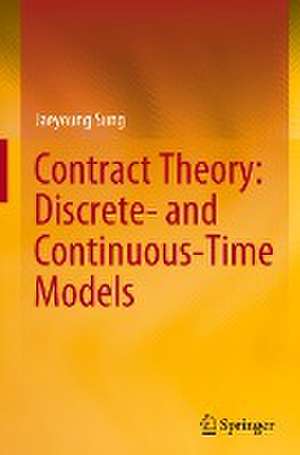Contract Theory: Discrete- and Continuous-Time Models
Autor Jaeyoung Sungen Limba Engleză Hardback – 10 dec 2023
This book is written in a manner that makes complex mathematical concepts more accessible to economists. However, it would also be an invaluable tool for applied mathematicians who are looking to learn about possible economic applications of various control methods.
Preț: 639.10 lei
Preț vechi: 751.88 lei
-15% Nou
Puncte Express: 959
Preț estimativ în valută:
122.37€ • 127.42$ • 101.53£
122.37€ • 127.42$ • 101.53£
Carte tipărită la comandă
Livrare economică 14-28 februarie
Preluare comenzi: 021 569.72.76
Specificații
ISBN-13: 9789819954865
ISBN-10: 981995486X
Pagini: 345
Ilustrații: XVII, 345 p. 21 illus., 8 illus. in color.
Dimensiuni: 155 x 235 mm
Greutate: 0.69 kg
Ediția:1st ed. 2023
Editura: Springer Nature Singapore
Colecția Springer
Locul publicării:Singapore, Singapore
ISBN-10: 981995486X
Pagini: 345
Ilustrații: XVII, 345 p. 21 illus., 8 illus. in color.
Dimensiuni: 155 x 235 mm
Greutate: 0.69 kg
Ediția:1st ed. 2023
Editura: Springer Nature Singapore
Colecția Springer
Locul publicării:Singapore, Singapore
Cuprins
Introduction.- Incentive Problems.- Basic Structures of Contracting Problems.- Discrete-Time Formulation I.- Discrete-Time Formulation II.- Contracting in Continuous Time: Time-Multiplicative Preferences.- Optimal Performance Metrics.- Contracting under Incomplete Information.- Career Concerns in Competitive Executive Job Markets.- Agency Problem in Weak Formulation.- Contracting with a Mean-Volatility Controlled Outcome.- Hierarchical Contracting: A Mean-Volatility Control Problem.- Contracting in Continuous Time: Time-Additive Preferences.- Contracting under Ambiguity: Introduction.- Contracting under Ambiguity in Continuous Time.- Information Asymmetry: Hidden Information.- Information Asymmetry: Adverse Selection.- Information Asymmetry: Adverse Selection and Moral Hazard.
Notă biografică
Jaeyoung Sung is currently Professor Emeritus of Finance at Ajou University, South Korea. He served as principal investigator of the WCU (World Class University) project to establish a world-class financial engineering program at Ajou University. He also taught at University of Illinois at Chicago, and he was visiting professor at Washington University in St. Louis, University of New South Wales, and University of Southern California. His research interests lie in agency theory, asset pricing and market microstructure. He has published on continuous-time agency problems in economics and finance journals such as Journal of Economic Theory, Rand Journal of Economics, Review of Financial Studies, Mathematical Finance, and others.
Textul de pe ultima copertă
This book provides a self-contained introduction to discrete-time and continuous-time models in contracting theory to advanced undergraduate and graduate students in economics and finance and researchers focusing on closed-form solutions and their economic implications. Discrete-time models are introduced to highlight important elements in both economics and mathematics of contracting problems and to serve as a bridge for continuous-time models and their applications. The book serves as a bridge between the currently two almost separate strands of textbooks on discrete- and continuous-time contracting models
This book is written in a manner that makes complex mathematical concepts more accessible to economists. However, it would also be an invaluable tool for applied mathematicians who are looking to learn about possible economic applications of various control methods.
This book is written in a manner that makes complex mathematical concepts more accessible to economists. However, it would also be an invaluable tool for applied mathematicians who are looking to learn about possible economic applications of various control methods.
Caracteristici
Provides economics-oriented presentations of continuous-time contracting models Serves as a bridge between the two strands of existing textbooks on discrete- and continuous-time contracting models Written in a manner that is accessible to economists as well as mathematicians
